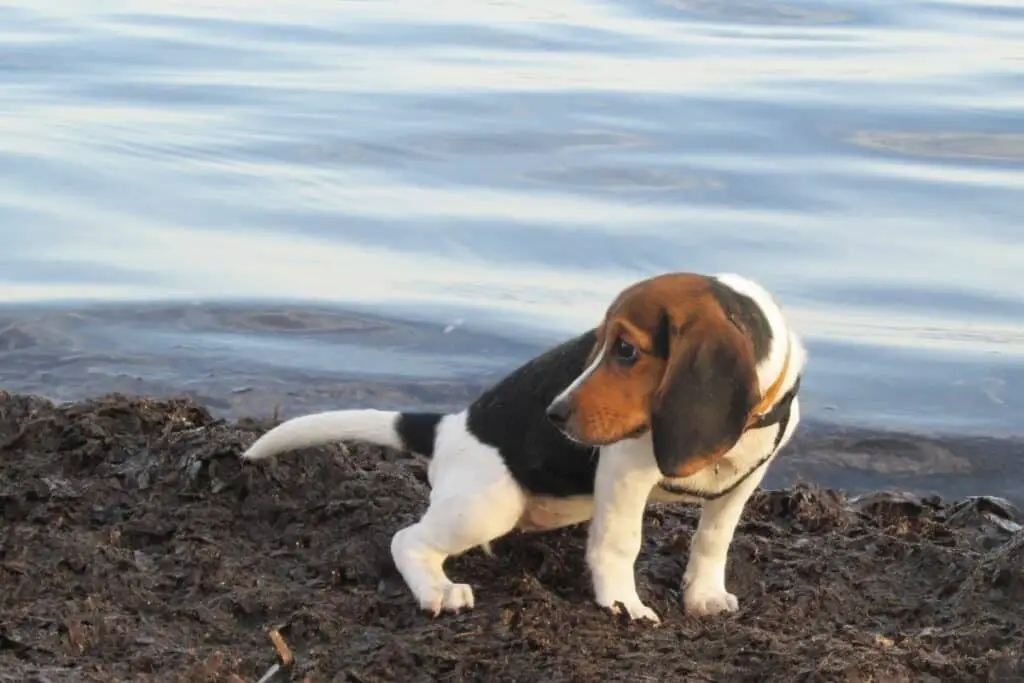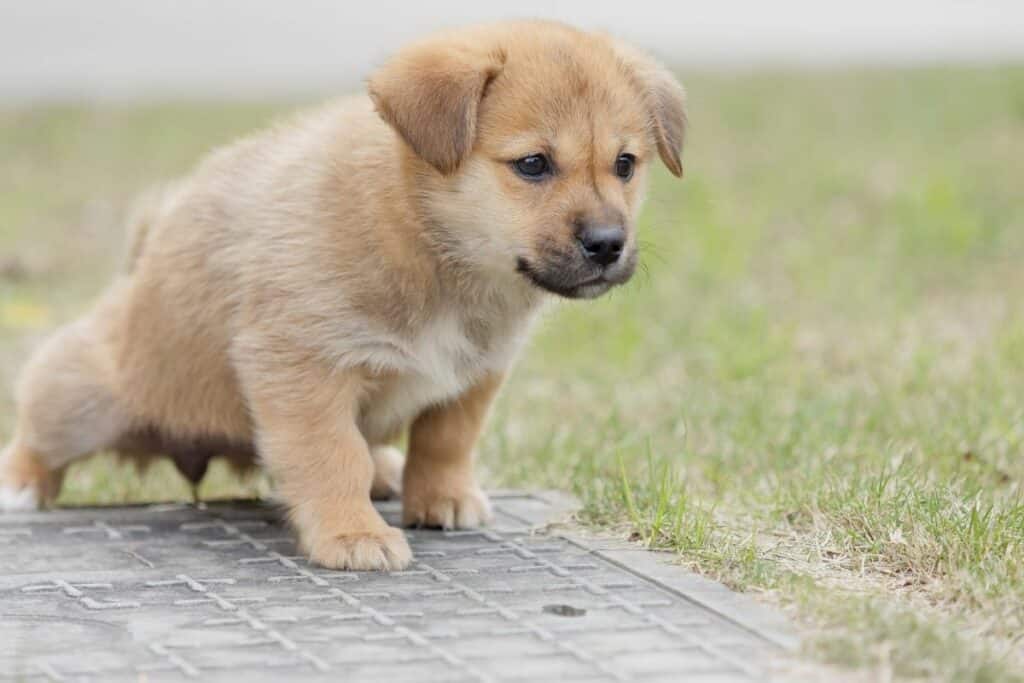Puppies are happiness incarnate. However, not everything they do bring a smile to your face. Anyone who has ever had a puppy knows that these bundles of joy can, at times, be a nightmare.
From the tantrums to the constant pooping and peeing – not everything is fun. If you have ever had a puppy, you will instantly know that puppy pee is one of the worst things to deal with.

Puppies need to pee a lot, more than an adult dog, but how much? What if your puppy needs to pee every 15 minutes (literally)? Well, this article might be the one for you.
Here, we are going to take a look at how often puppies usually pee, and what you can do if you think your new companion is peeing a little too much.
Puppy Peeing – What is Normal?
The time between peeing will vary, depending on how old the animal is. Typically, a puppy that is one month old will need to pee every hour, a two-month-old puppy every two hours, and so on until they are nine months old.
Water will travel through the bladder very quickly, and it is possible that after just 10-30 minutes, your puppy will need to relieve themselves.
As a general rule, puppies younger than six months should be taken outside to do their business every hour. When a dog is nine months or older, they should have the functions of an adult.
Adult dogs can hold their bladder for up to eight hours, and usually only need to be taken out three times a day to pee.
How Often Should a Puppy Need to Pee?
Below is the breakdown of how often a puppy should need to pee. If your puppy’s peeing habits are very different to those mentioned below, it might be a medical issue or behavior that needs to be addressed.
- One month – every 1 hour
- Two months – every 2 hours
- Three months – every 3 hours
- Four months – every 4 hours
- Five months – every 5 hours
- Six months – every 6 hours
- Seven months – every 7 hours
- Eight months – every 8 hours
- Nine months and older – every 8-9 hours.
Please remember that this is only a rough guide to follow. Every puppy will be different, and initially you may have a puppy that needs to pee several times in an hour. The size of the puppy, as well as its breed, can have an effect on this. Active puppies may need to pee more regularly than puppies who like to sleep a lot, and that needs to be taken note of.
Only when puppies reach 4-6 months old should you start to feel concern. If a puppy is four months old and still peeing every 15 minutes, there might be a cause for concern. Before this time period, however, simply keep an eye on your puppy and make an effort to house train them.
Why Would Your Puppy Need to Pee Every 15 Minutes?
If your puppy seems to need to see more regularly than they should, there could either be a medical or behavioral issue that needs to be solved. It will be worth checking in with your vet if your puppy doesn’t follow the expected routine.
Nervous
A nervous puppy will be peeing a lot more than one is comfortable and feels at home. This may also be due to being anxious about something.
You may notice that when your puppy is anxious, he will start to shake his head from side to side. This is called “wagging” and is a sign of anxiety. If you notice that your puppy seems anxious, try to figure out what is causing it.
When you determine the cause, you can either help the puppy become less anxious or it, or remove it if possible.
For example, if there is a scary sculpture in the house and the puppy seems anxious around it, remove the sculpture to another area. It may be something insignificant, but it can have a lasting impact on the animal.
Similarly, the puppy might be nervous or anxious around a certain person. Work on that and try to get the puppy to see that they are not a threat.
This might have to be done with the help of a professional, but this is typically an issue that can be resolved fairly quickly.
Medical Reasons
There are a number of medical reasons that could cause your puppy to need to pee every 15 minutes. These include:
- Bladder stones – bladder stones in puppies are rare, but can occur as they grow. They are caused by bacteria building up inside the bladder, which then causes the urine to back up into the bladder. Bladder stones can be removed surgically, but most puppies don’t require surgery unless they’re having trouble urinating.
- Urinary tract infections (UTI) – UTIs are common in young puppies and can be treated with antibiotics. A UTI occurs when bacteria enters the urinary system and starts growing. Symptoms of a UTI include frequent urination, blood in the urine, pain while urinating, vomiting and diarrhea.
- Kidney problems – some kidney problems can inhibit a puppy’s ability to hold their bladder long enough for them to go outside. The most common issue is called polycystic kidney disease. Other conditions like renal failure can result in needing to pee frequently.
- Diabetes – diabetes can affect a puppy’s ability to regulate their body temperature, which can lead to frequent urination.
- Pregnancy – pregnant bitches often need to pee every few hours because of the increased amount of hormones going through their bodies.
- Hormonal issues – hormonal changes during pregnancy can cause a bitch to need to pee frequently.
- Neurological Disorders – neurological disorders can cause a puppy to need to pee frequently. Some examples include epilepsy, spinal cord injury, brain damage, and neurodegenerative diseases such as Alzheimer’s Disease.
- Liver Disease – puppies who suffer from liver disease tend to have elevated levels of ammonia in their bloodstream. When this happens, the puppies can develop muscle weakness, seizures, difficulty breathing, and coma. Livers can be removed in dogs, so if the dog has been diagnosed with liver disease, surgery might be recommended.
- Cancer – cancer can also cause a puppy to have to go frequently. If a tumor is found in the abdomen, the dog will likely need to undergo chemotherapy.
- Heart Disease – heart disease can cause a puppy to have high blood pressure, which can make them feel weak. This can lead to excessive drinking, which in turn can cause them to urinate more often.
Cystitis – cystitis is inflammation of the bladder caused by infection. It can be treated with antibiotics or other medications.
It is important to note that these conditions are rare, and most cases are caused by other factors. However, if you suspect that any of these conditions are present, it is best to consult a veterinarian as soon as possible.
Regularly, we will not notice other warning signs our puppies might exhibit.
This may be because they are a new member of the family and there is little to no baseline for ‘normal’ behavior. Also, puppies can be very strange (and loveable!), so their naturally odd behaviors could be interpreted differently.
Behavioral Issues
Puppies tend to act differently than adults. They don’t always know how to behave in social situations. Some dogs just aren’t social animals and prefer to stay inside.
Others are outgoing and want to go outside all day long. There are many things that can affect your puppy’s ability to interact socially, and some of these can be tied in with their inability to hold their bladder.
If you suspect that your puppy’s constant peeing is because of a behavioral issue, you might need to get the help of a professional trainer.
Professional trainers will often have an insight into the world of puppies that many of us overlook. By taking the time to work with a trainer, you can get to the root of the issue, and solve it. Both you and your pet will be thankful!
How to Help?

No matter what the cause is, there is something you can do to help your puppy. The most important thing to do is make sure that dog new dog feels happy and comfortable.
It is very difficult to work with and train a dog that is constantly on edge and untrusting. Form a bond with your pet and allow time to get to know one another.
If There is a Medical Issue
While it is essential to keep track of your puppy’s overall health and happiness, it is even more essential to watch out for potential medical issues. If your puppy is having frequent problems going to the bathroom, then it is essential to take him to the vet right away.
Puppies have much smaller bladders than adult dogs, so if they start having frequent accidents, it could be a sign of a concern. A vet can help determine whether your puppy needs medication or treatment.
Your vet will know what to do, so try not to worry too much. You must also allow a grace period between getting the puppy and the issues occurring. The puppy may simply need to get used to their new surroundings and the new people in their life!
If it is a Behavioral Issue
The easiest way to deal with this issue is to first figure out why your puppy is peeing frequently. Once you understand the reason behind it, you will be able to better treat it.
While this isn’t always possible, working with a professional trainer who specializes in helping with behavioral issues can really help you.
You should never punish your puppy for urinating – it is normal behavior, and there is nothing wrong with your puppy. Instead, reward your pup when he goes potty; give them lots of praise and affection.
If you have a litter of puppies, you will definitely need to use a crate. This helps them feel secure, and makes them feel like they’re at home.
Once you are confident that your puppy understands what is expected of them and how to behave properly, you can begin training.
Start by letting your puppy loose in the house during the day when everyone else is around. Once they realize that there is no real danger, you can begin teaching them how to properly go to the restroom outside.
As previously mentioned, you should never punish your puppy if they wet the floor, just teach them how to control themselves. When they are ready, you can move them into an outdoor kennel area, where there are plenty of places to potty.
They can still be outside during the day, but they need to learn how to control themselves. At night, you should put your puppy in a crate until morning. Make sure that you don’t let them out all night long, as this can lead to more accidents.
Keep in mind that puppies are going through a lot of physical changes, and they aren’t always able to sleep soundly. So, if you see that your puppy has had a few accidents throughout the night, then don’t be afraid to wake them up and help them go to the bathroom.
What Kind of Training Works?
There are main type of training is operant conditioning (positive reinforcement). Operant conditioning works best with puppies because it teaches them to associate good things with the action of doing good things.
Positive reinforcement is always best. It works on the basis that if something happens, such as your dog pees where they are supposed to, then they will receive some sort of reward. For example, they might get a small food treat, a pat on the head, a toy, etc.
These rewards show the puppy that performing certain actions leads to receiving positive attention from you.
Negative reinforcement is another form of operant conditioning. With negative reinforcement, you would remove any negative consequences associated with your puppy’s naughty habits. This method is not recommended, especially for puppies.
Final Thoughts
Puppies will need to pee a lot more than their adult counterparts will. Depending on their overall health, diet, and how active they are, some will need to go more than others.
It’s important to never get angry at a puppy is accidents happen, because they are still so young and simply need to learn. No one can control their bladder at such a young age, and dogs are not different.
If you feel like your puppy is peeing more than they should, when they shouldn’t be, get in touch with a vet. They may want to take a look at your puppy’s diet or other medical conditions that could be causing this problem.
- What Dog Breeds Have Pink Skin? - March 24, 2023
- What Are the Most Inspiring Dog Breeding Quotes? - March 20, 2023
- Can Pheromone Spray Help Improve Dog Breeding Results? - March 19, 2023








